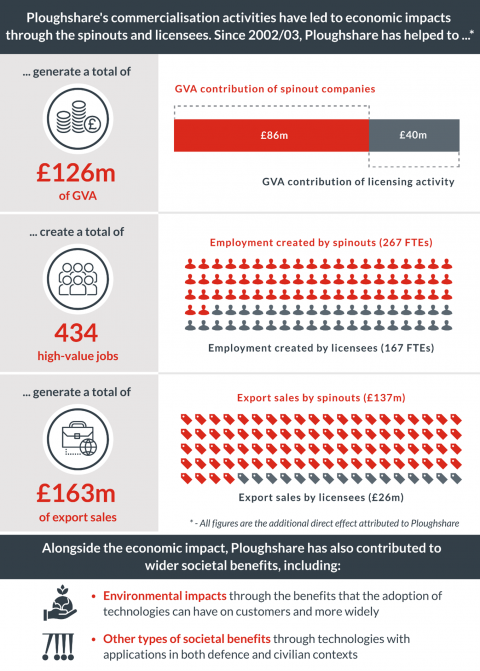Economic and wider assessment of Ploughshare's activities
Knowledge assets, which include intellectual property (IP), are of growing importance to the UK economy. Ploughshare Innovations Limited (Ploughshare) is a key player in the UK public sector landscape, as both an early mover and an example of good practice. Ploughshare was established in 2005 by the Defence Science and Technology Laboratory (Dstl), which is funded by the UK Ministry of Defence (MOD), to enable the IP generated by Dstl and wider MOD to be commercialised through licensing and the creation of spinout companies.
In 2023, SQW was commissioned by Ploughshare to assess the economic and wider benefits of the commercialisation activities that it delivers. This was intended to provide an update to previous assessments completed by SQW in 2015, 2017 and 2021. The most recent assessment covered 64 companies, including 16 spinouts and 48 licensees, with the benefits traced back to 2002/03 when commercialisation was undertaken in-house by Dstl. The analysis focused on key indicators relating to employment created, the value of exports and Gross Value Added (GVA).
The report has now been published and can be accessed here. Key findings from the assessment include the following:
- The IP from Ploughshare typically plays a central role in the development of companies and/or their products and services. Without Ploughshare, there would have been very few, if any, options for companies to develop similar technologies. Ploughshare’s role extends beyond the IP, with a range of additional support provided as well as access to networks.
- It is estimated that over the last 20 years (from 2002/03 to 2022/23), Ploughshare’s role in endowing companies with IP has contributed around £126 million to GVA and created 434 jobs that are attributable to Ploughshare.
- In addition to the economic benefits, we found evidence of wider societal benefits:
- Nine of the 20 companies consulted reported actual or potential environmental benefits associated with the technologies. This was through the benefits that the adoption of products/services can have on the companies’ customers and more widely.
- The application of the technologies is also associated with other types of societal benefits, in both the defence sector (thereby contributing to the MOD’s objectives and priorities) and in civilian contexts. Outside of defence, there were examples of the products/services bringing about societal benefits across a range of different contexts, including law enforcement, cyber security and health.

For further information regarding SQW’s work on the study, please contact Kadriann Deacon via KDeacon@sqw.co.uk.

